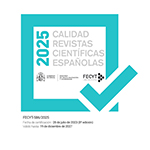Collaboration in Colombia. The case of the National Planning Council
Abstract
The objective of this article is to analyze the National Planning Counsel (NPC), main institution in Colombia for the coordination between the government and non-state actors, such as civil and economic actors, for the planning processes in the country. The intention is to evaluate the autonomy of the Counsel and its institutional design and elaborate a critical analyzes taking into account two frame works: the purpose of its constitutional origin and the orientation given by the modern governance theory. According to the descriptive-analytic character of the investigation, document analysis was determined as the methodological instrument, as much as it facilitated the access to the information and it provided an intellectual model for its analysis and recovery.Downloads
Article download
License
In order to support the global exchange of knowledge, the journal Cuadernos de Gobierno y Administración Pública is allowing unrestricted access to its content as from its publication in this electronic edition, and as such it is an open-access journal. The originals published in this journal are the property of the Complutense University of Madrid and any reproduction thereof in full or in part must cite the source. All content is distributed under a Creative Commons Attribution 4.0 use and distribution licence (CC BY 4.0). This circumstance must be expressly stated in these terms where necessary. You can view the summary and the complete legal text of the licence.







